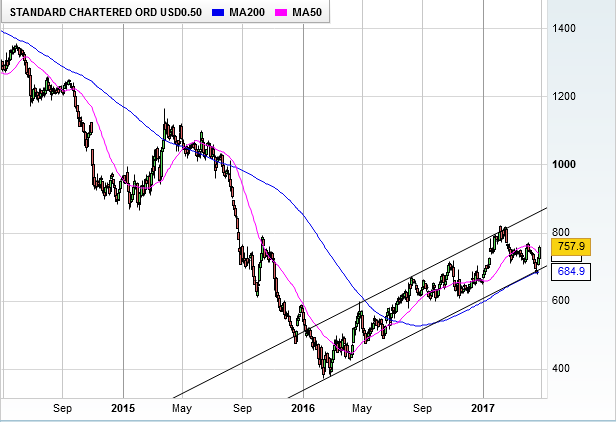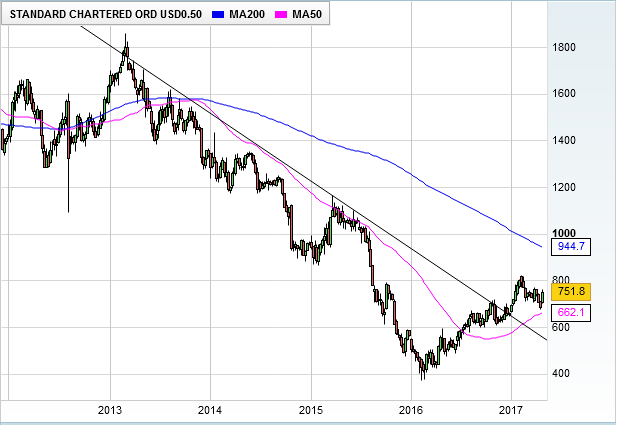Surging Standard Chartered defies the doubters
26th April 2017 14:27
by David Brenchley from interactive investor
Share on
Traders acted quickly when released its first-quarter results Wednesday. Made public at 9.30am, the shares had risen over 5% to 764p within half-an-hour and, after a brief blip, have resumed their recovery rally.
Fair to say, then, that investors were impressed and boss Bill Winters spoke of the "good progress" the lender's been making progress turning round the business.
Typically seasonally a good quarter, underlying pre-tax profits of $1 billion (£814 million) was a whopping 32% ahead of consensus estimates and almost double last year's number, driven by much lower impairments. Income of $3.6 billion was up 8% year-on-year, flattered by the non-recurrence of a $130 million loss at its principal finance business.
Meanwhile, its common equity tier 1 (CET1) ratio - the measure of a banks' capital adequacy - has improved by 20 basis points since the end of 2016 to 13.8%, above Standard's 12-13% target.
However, analysts, and the company itself, sounded notes of caution. Standard said that, as well as good cost control, its higher profit figure was driven by a "particularly low" loan impairment of $198 million (down 58% year-on-year).
In fact, Standard went on to comment that "loan impairments were unusually low and we remain cautious about credit conditions in our markets". Analysts at both Investec and Barclays agreed that this level is unsustainable.

One thing the results - particularly the CET1 figure - did do was raise investors' hopes that Standard would resume dividend payments soon. Analysts think so, too.
"Even though we only model a 'shallow' recovery in earnings per share, we do expect a 2017 interim dividend (of 5 cents per share) to be declared in August," said Investec analyst Ian Gordon. "Our 2019e dividend per share forecast of 45 cents represents a prospective dividend yield of 4.8%."
Not bad, though clearly still behind rivals like offering a prospective 8.6% and 6.4%.
Winters added that, despite competition remaining intense, "our investments in the business and focus on our clients is making us more competitive and will enable us to deliver sustainable income growth over time".
Other notable highlights included customer accounts and net loans and advances to customers up 5% to $398 billion and $270 billion respectively, while the group already meets its expected minimum requirement for own funds and eligible liabilities for 2022.
Earlier on this week, Interactive Investor chartist John Burford spoke of a relief rally that was underway, reversing the "stunning bear run" that knocked the Standard Chartered shares down to a January 2016 low of under 400p.
His updated chart shows a line that since 2013 has been acting as resistance now turning into support. "If the market can retreat to test it, that would likely be a great area to buy," he reckoned.

But Barclays analyst Rohith Chandra-Rajan remains 'underweight' with a price target of 575p, implying downside of around a quarter. "We continue to see revenue growth as the key challenge facing Standard Chartered as it seeks to raise returns from low single digits."
Investec's Gordon has put his target of 685p under review. Using Winters' February 2016 statement that Standard is "now ready to start running" comment, he sees evidence of a "gentle job" in today's numbers.
Any notion of a return to normal levels of profitability remains distant, he added, with the scale of revenue uplift required rendering a return on tangible equity of over 10% "a 2021e aspiration".
Small steps for now, then, and despite already doubling since February 2016's multi-year low of 373p, Standard Chartered still only trades on only 0.8 times tangible net asset value (TNAV).
However, forecasts rely heavily on about 100-150 basis points of US rate rises, which, if they don't happen, will make the valuation "overly optimistic", according to Deutsche Bank.
In that case, and without a bid for the business, Standard will require a big improvement in emerging market growth and commodity price expectations to beef up revenue and impairments, or drop in sterling given substantial dollar earnings.
This article is for information and discussion purposes only and does not form a recommendation to invest or otherwise. The value of an investment may fall. The investments referred to in this article may not be suitable for all investors, and if in doubt, an investor should seek advice from a qualified investment adviser.